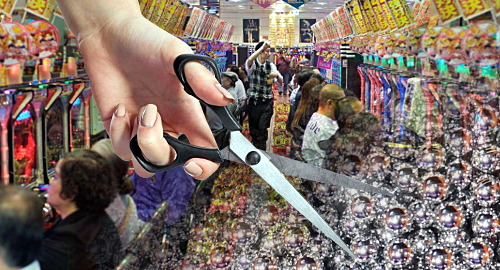 Japan’s struggling pachinko industry is reeling from fresh rumors that players’ current maximum allowable winnings will be cut in half.
Japan’s struggling pachinko industry is reeling from fresh rumors that players’ current maximum allowable winnings will be cut in half.
Shares in Japan’s pachinko operators took a tumble this week after local media reported that the government planned to impose further reductions in player payouts. A report in the Japan Times suggested the National Police Agency (NPA) plans to cap the maximum pachinko profit for an average four-hour playing span from the current ¥100k (US $877) to below ¥50k.
The NPA is reportedly preparing to issue a draft of new regulations for entertainment businesses that will be subject to public comment prior to being formalized. The draft proposes lowering the number of pachinko balls that can be won over a four-hour span by about one-third, while the maximum number of balls generated by a jackpot would be reduced from 2,400 to 1,500.
The NPA also wants pachinko parlor managers to train employees on how to recognize signs of problem gambling behavior and how to talk to customers regarding activity that appears to be problematic.
The curbs are expected to put further downward pressure on Japan’s pachinko industry, which is already a shadow of its former self. There were over 18k parlors in 1995, the year the pachinko industry peaked, while 2016’s total was slightly less than 11k. Much of the decline has been blamed on previous payout caps, although a larger problem may stem from younger generations’ relative lack of interest in the pastime.
News of the NPA’s proposed curbs caused a mild panic among pachinko investors, who pushed Sega Sammy Holdings’ shares down over 7%, while Universal Entertainment Corp saw its stock slip nearly 5%, despite the Nikkei index posting modest gains on the day.
The proposed curbs reflect the unease many Japanese officials feel over the country’s push to reverse longstanding tradition by allowing the construction of casinos in new integrated resorts. The NPA is expected to impose similar payout curbs on the new casinos’ slot machines, with the expectation that the caps will discourage problem gamblers from ‘chasing’ their losses.